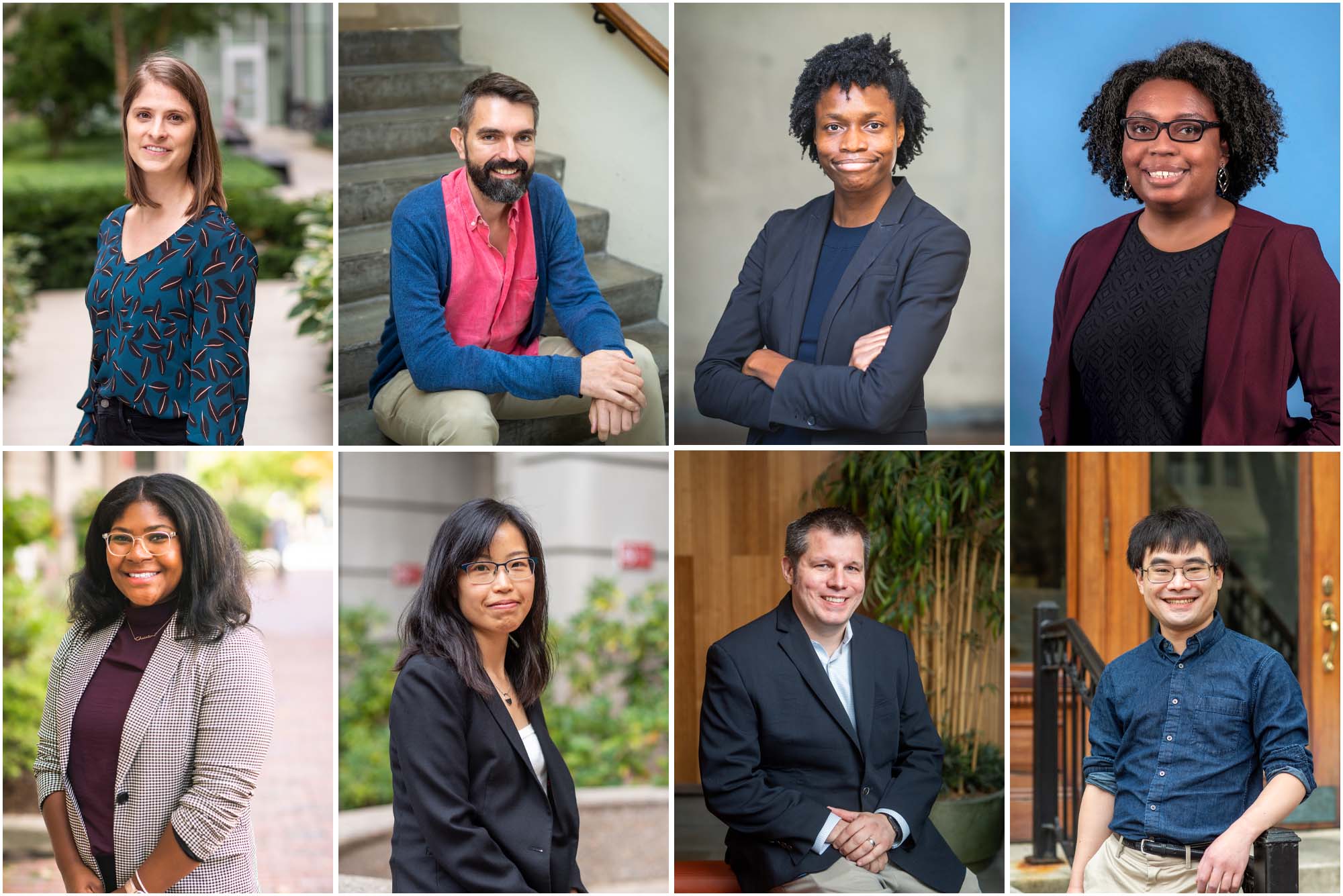University Names Eight Junior Faculty to Career Development Professorships for Promising Scholars
Recipients include an Alzheimer’s researcher, a Black politics scholar, and a historian

BU’s new Career Development Professors are Heidi Meyer (top row, from left), Jean-Pierre Roussarie, Ngozi Okidegbe, Erica Pratt; Christine Slaughter (bottom row, from left), Tesary Lin, Daniel Dempsey, and Rui Hua.
University Names Eight Junior Faculty to Career Development Professorships for Promising Scholars
Recipients include an Alzheimer’s researcher, a Black politics scholar, and a historian
Heidi Meyer seeks answers to a haunting question that could improve treatments for emotional health problems: how do early-life experiences shape the way we express fear and safety-related behavior as adults?
“My research investigates how the ability to control emotional behaviors develops across adolescence,” says Meyer, a College of Arts & Sciences assistant professor of psychological and brain sciences. With cutting-edge technologies such as fiber photometry (an imaging method) and optogenetics (controlling neurons’ activity with light), Meyer and colleagues observe and change real-time neural activity in adolescent mice brains.
“By considering how early life experiences, such as stress or trauma, impact the brain, our work takes us closer to understanding the causes of psychiatric conditions such as anxiety and PTSD,” she says. “Our findings can inform new treatments for psychiatric disease that are tailored to the developing brain, and perhaps even curb the development of symptoms before they become a lifelong affliction.”
Her work has made Meyer the 2022-2023 Cecile Kaplan Dalton Career Development Professor. She is one of eight assistant professors receiving Career Development Professorships this year. Meyer’s was established by BU trustee Nathaniel Dalton (LAW’91) and his wife, Amy Dalton (LAW’91).
Our work takes us closer to understanding the causes of psychiatric conditions such as anxiety and PTSD.
The professorships are given annually by the Provost’s Office to junior faculty who have been nominated by their deans and colleagues as promising scholars in their fields. Variously named for the donors and alumni who fund them, Career Development Professorships are tied to specific BU schools in some cases; all appointments are for three years and provide financial support for the recipients’ salaries and scholarship. This year’s recipients will be honored at a dinner this evening, September 27.
Meyer holds a bachelor’s degree from the University of California at Santa Cruz and a PhD from Dartmouth. She did her postdoctoral training at Weill Cornell Medicine.
This year’s other Career Development Professors:
Peter Paul Career Development Professor, established by BU trustee emeritus and University Advisory Board member Peter Paul (Questrom’71)
Jean-Pierre Roussarie, School of Medicine assistant professor of anatomy and neurobiology. Roussarie researches early-stage Alzheimer’s disease, focusing on a vulnerable cell type and using cutting-edge genomics to identify targets for disease-modifying drug treatments. He earned a bachelor’s degree at École Polytechnique and a master’s and a PhD at the Pasteur Institute.
Moorman-Simon Interdisciplinary Career Development Professors, established by Ruth Moorman (CAS’88, Wheelock’89,’09) and her husband, Sheldon Simon
Ngozi Okidegbe, School of Law assistant professor of law. Combining data science and legal scholarship, Okidegbe studies how technologies in the criminal justice system, such as algorithms, used for pre-trial detention, bail, and sentencing disproportionately hurts racially marginalized communities. She received a bachelor’s from Concordia University and law degrees from Columbia University’s and McGill University’s law schools.
Erica Pratt, College of Engineering assistant professor of biomedical engineering. Pratt deploys an array of sciences—engineering, chemical biology, oncology, and the new field of liquid biopsy—to develop novel, minimally invasive methods for detecting and ultimately treating, multiple types of cancer. She holds a bachelor’s from Carnegie Mellon and a master’s and a PhD from Cornell.
Christine Slaughter, College of Arts & Sciences assistant professor of political science. Slaughter uses political science, psychology, and public health to probe how inequality, gender, and resilience influence African American political participation—both its substance and frequency. She earned a bachelor’s from Spelman College and a master’s and a PhD from UCLA.
Isabel Anderson Career Development Professorship, established by the estate of Boston philanthropists Isabel and Larz Anderson
Tesary Lin, Questrom School of Business assistant professor of marketing. Using data science and digital analytics, Lin studies the value that consumers accord privacy and whether that’s affected by how firms use the data they collect. She received her bachelor’s from Nankai University in China, her master’s from China’s Tsinghua University, and her PhD from the University of Chicago.
Ralph Edwards Career Development Professor, established by the estate of Ralph Edwards (MED’52)
Daniel Dempsey, MED assistant professor of dermatology. Seeking potential new treatments for cancer, Dempsey studies the traits and regulation of proteins used in cell signaling and gene regulation. He uses chemical, semisynthetic, biophysical, and cellular approaches in his research. He has bachelor’s and master’s degrees from SUNY at Oswego and a PhD from the University of South Florida. He did his postdoctoral training at Brigham & Women’s Hospital and Harvard Medical School.
East Asia Studies Career Development Professor, established by an anonymous, Taiwan-based alumnus
Rui Hua, CAS assistant professor of history. Hua studies the 20th-century roots of China’s modern legal system and the roles of peasants and migrants in the codification of rules, rights, and regulations, especially regarding land use and property rights. He received his bachelor’s from Peking University and his master’s and PhD from Harvard.
“These awards highlight the caliber, potential, and continued vitality of Boston University’s dynamic faculty,” says Jean Morrison, provost and chief academic officer. The recipients “have been recognized for their extraordinary accomplishments in their areas of study, their passion for the creation and transmission of new knowledge, their efforts to enhance the student experience, and their potential to develop into outstanding faculty members.”



Comments & Discussion
Boston University moderates comments to facilitate an informed, substantive, civil conversation. Abusive, profane, self-promotional, misleading, incoherent or off-topic comments will be rejected. Moderators are staffed during regular business hours (EST) and can only accept comments written in English. Statistics or facts must include a citation or a link to the citation.